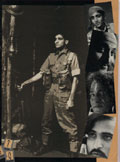December 1996. Editor: Anjum Katyal
With her genius for slicing through to the nerve centre, Mahasweta Devi writes in her recent story,Choli ke Pichhe: questions, prioritizing: which are the issues, and which the non-issues? This is an area of concern which, one way or another, has haunted us as a major theme through the year. What the mainstream media (Choli ke Pichhe) decides for us is what the issues are. Outside its restless searchlights lies the Alternative, occasionally getting caught up in the crossbeams, in the passing. It is becoming increasingly clear that what defines the Alternative is its concern with issues that are resistant to sensationalist attention and easily packaged solutions. In terms of theatre this means experimental work, work in which process matters as much as production, work which communicates important values, which conscientizes, which affects beyond entertainment. STQ reaffirms its commitment to the Alternative. As a forum, as a support system, as a dissemination service. So that, in the words of Mahasweta Devi, the 'non issues' do not get completely trampled into the dust.
CONTENTS 'The Psychiatry Ward Became A School Of Acting For Me. Mohan Agashe 'I was moved by certain things and I wrote them Kee Thuan Chye Do they let us sing our songs? Dr Jose George Playscript: The Corpse Eaters Karthikeyan Padiyath On Acting Anuradha Kapoor Bengali Theatre: The end of the colonial tradition? Samik Bandopadhyay Invisible Theatre Prabir Guha Tracing it back to the Sixties: A Round Table with Playwrights and Directors Sudeshna Banerjee Theatrescapes Samik Bandopadhyay Theatre Log Theatre Workshop in Bankura Pullab Roy Workshop in Puppetry Seema, Trupti, Ganga Mukhi and Ashwini Deo A Performative Workshop for Women Activists Sohini Bhattacharya, Paramita Banerjee National Festival of Street Theatre Rachana Ghosh Notebook Download the complete issue here
